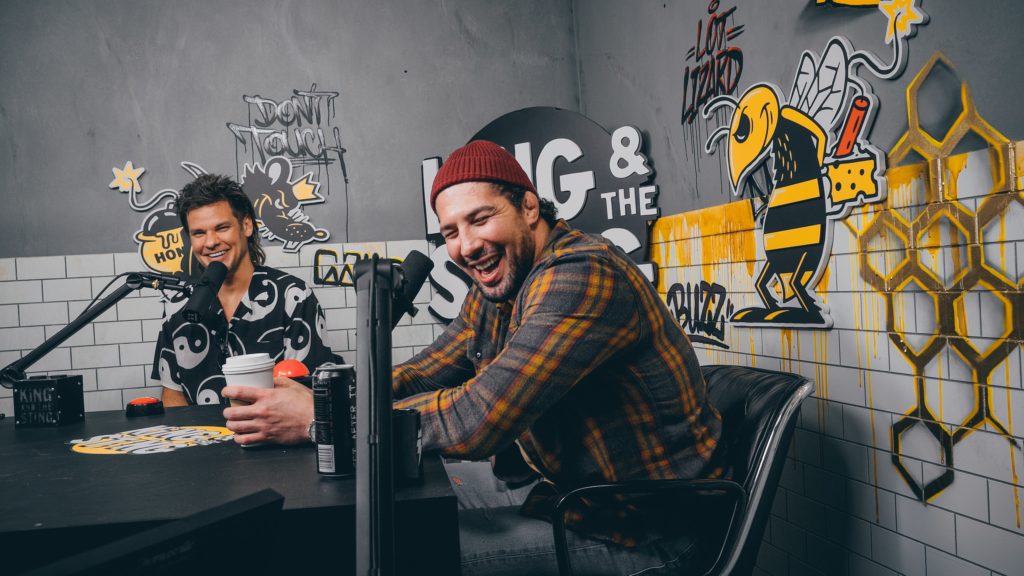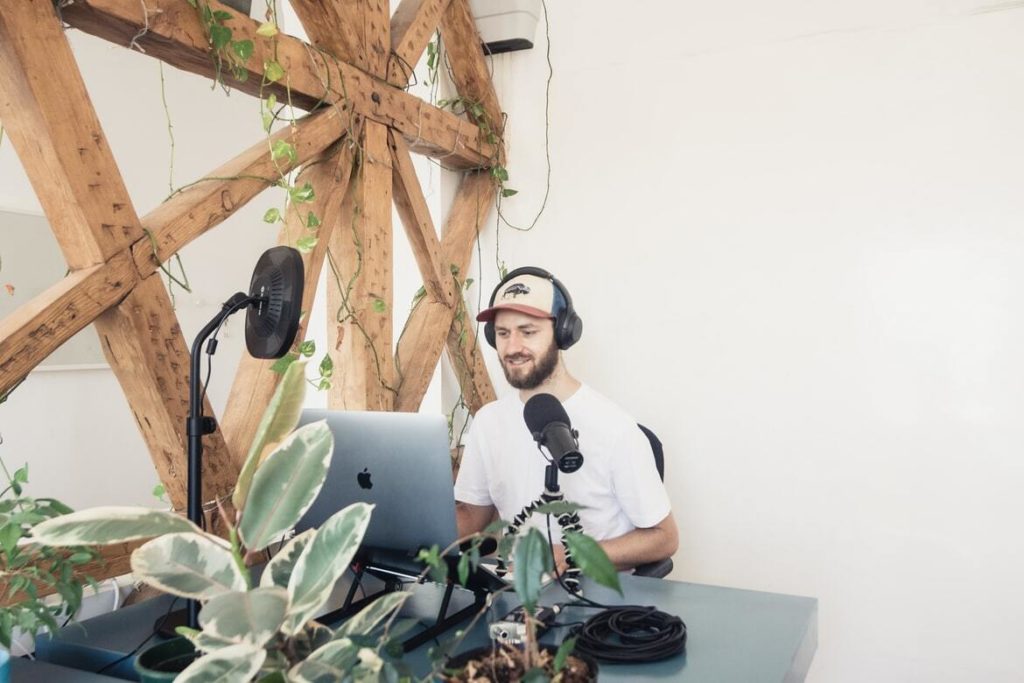Depending on the type of podcast you host, you may need to have some guests come over and conduct podcast interviews with them. Your first time conducting an interview? Don’t worry, we’ve been there, and we’re going to help you prepare and ask the right interview questions. This is quite important for your show’s content quality. In fact, it can also save your good-natured relations with your guests. If you’ve been on the receiving end of a cringe-worthy interview experience, you know what we’re talking about. So let’s get right into it!
Why should I have guests for my podcast?
Let us first clarify that not all podcasts do well with guests and interviews. Many won’t need them, while others would have them from time to time; however, there may still be podcasts that do not need guest interviews or do better without them. However, generally speaking, guests can be good because:
- They bring new voices, insights, and views to your show
- Keep things interesting and fresh for listeners
- Increase your listener pool from your guests’ personal network
- Increase your listener pool from your guests’ podcast audience and followers (if they have their own show or following base)
- A way to beat creative blocks
- Keep things fun for you!
Who should I invite? How do I find guests?
Who your guests are would somewhat depend on the type of podcast you’re hosting; but your guests can generally comprise of friends and family, other podcasters, industry experts, professionals, celebrities, influencers, and even your audiences! What you can get out of each can differ, so it’s best to first figure out what you’re hoping to achieve with your guests.
When inviting guests with whom you’re already familiar with such as friends, family, and those in your personal network, a simple text message would suffice. For professionals and experts you personally know, you can consider visiting their office or writing them an email (again depending on the nature of their work). However, it may be more challenging to invite notable personnel, celebrities, and influencers. Do not be disheartened if you don’t hear back from them!
Know that you’re not the only one writing to them, especially if they’re minor to major influencers. Make sure your email stands out by adding personal touches (instead of sending generic letters to everyone) and keeping it concise while communicating all relevant information. Some of these information may include:
- Your show information and brief personal background
- Podcast data and stats, when appropriate
- The topic you’re hoping to discuss
- Why they would be the best fit for this topic on your show
- Anticipated dates on recording and publishing
- Benefits both sides can attain from this project
- Any tangible benefits offered, when appropriate

1. Do your research and prepare beforehand
It would be embarrassing to ask questions like:
- “So what do you do?”
- “Have you recently released episodes on ________ topic?”
- “What is your podcast about?”
These information are things you should have known beforehand before inviting them to guest on your show; and not knowing them during the recording day would make it seem as if you don’t value your guests. If you want to ask these questions for the sake of unaware audiences, you can ask these questions in the following (or similar ways):
- “Just to let our listeners know, what does it mean to be a _________?”
- “I noticed that you recently released episodes on _________. Could you tell us more about it?”
- “You talk a lot about ________ in your podcast, can you tell us what motivated you to do so?”
2. Structure a (flexible) interview flow
You need to clarify the goals and direction of your interview. This will help you figure out which questions would work best for your show. Some self-reflecting questions: What is the main point or agenda of this episode? How can my guest contribute best to this topic based on their background? What is the main takeaway I want my listeners to gain? Letting your guest know about the topics to be covered beforehand would be a considerate move to help them prepare as well.
If you’re good at improvising, you may not necessarily need an interview flow structured out. You can simply take note of some critical “must-have” questions just in case your forget. However, if you have trouble coming up with impromptu questions, easily blank out, or have a short attention span, a structured interview flow will help you stay on track.
Here are some best practices for a structured (flexible) interview flow:
- Use key words instead of sentences. The goal of the structured flow is to remind you of the things you need to ask or cover during the session. It is best to keep the words short and simple instead of using a sentence or paragraph structure. This keeps you from simply reading what you have previously written and ask the questions in a way that’s more fitting to your actual recording situation.
- Keep it loose and flexible. The structure acts as a guide, not a road. Don’t be afraid to go off-topic if you think it would be interesting or would benefit your show. To add to point number 1, having your structure short and topical can also give you more flexibility.
- Include greetings and words of gratitude. If you’re the type to forget saying hello and thank you, you might want to include these things inside your flow structure…just in case.
- Greetings and gratitude
- Introduce guest and show
- Podcast host @ ______ since 2020
- Top 50 podcast charts on Apple and Spotify
- Nominated for best new podcast award
- The journey from ground zero
- Success factors
- Obstacles encountered
- Overcoming obstacles
- Learning through experiences
- Support system and advice for:
- Beginners
- Those struggling
- Plug social media of:
- Guest
- My podcast
- Encourage audience feedback
- Gratitude and closing
3. Structure your questions with open ends
You’d want to avoid asking a majority of yes/no questions. A good interviewee would be able to elaborate and provide more details, but you won’t be able to avoid the situation of people simply answering yes or no. The good news is: We can lead interviewees to respond with details and stories instead!
Here are some improved sample question structures:
- “Do you like your job?”
- Instead: “Could you tell us what you like or dislike most about your job?”
- “Working out has become your daily routine, right?”
- Instead: “How did you transition from sedentary to your current healthy lifestyle?”
- “Do doctors really get called up in the middle of the night to perform medical procedures?”
- Instead: “Could you recall a time when you were called up in the middle of the night to perform a medical procedure?”
Remember the 4 W’s and 1 H questions: Who, What, When, Why, How.
When necessary, yes or no questions would still be appropriate in certain circumstances; but it is important to ask good follow up questions. Don’t be afraid to ask clarifying questions. Some are hesitant to ask, thinking that it would be annoying for the interviewee; but it’s actually not. Your guest would become aware that you’re listening and that this topic is a point of interest, making it more probable for them to share more and provide more details on the matter.
4. Stay natural
The more awkward you are about it, the more awkward it will be.
Keep it natural and conversational, as if you were talking to a friend whom you’ve known for a long time. Feeling nervous and anxious? Take a deep breath and realize that it’s okay. That’s perfectly natural, especially when it’s your first time conducting an interview, but don’t worry, you’ll improve over time!
Just go for it, and don’t forget to press record!
5. Questions to avoid
Generally speaking, it would be best to steer away from negative phrasing or criticizing your guests’ viewpoints. There are also certain questions that may be inappropriate to ask during an interview. Of course, this still depends on cultural norms and your podcast’s theme and topic discussed. Avoid any overstepping and overly-sensitive questions that may make your guest feel uncomfortable.
Some topics that may be considered insensitive depending on your show’s theme include forcing your guest to pick between political parties, overly personal questions, or insisting on topics your guest just tried to avoid.

10 Best Interview Questions:
It can be hard to think of interview questions from scratch. Here are some sample interview questions that you might draw inspiration from:
- “How does your background influence your decision-making and lead you to where you are today?”
- “Could you briefly describe what your day-to-day looks like?”
- “What were the things that were seemingly irrelevant back then, but proved to be quite significant later on?”
- “What would you say is the most monumental event in this entire journey?”
- “Looking back at how far you’ve gone, what are some things you wish you knew back then?”
- “When you first started out, how did you manage all the negative feedback and discouragement?”
- “Who or what do you draw inspiration and strength from when it gets tough?”
- “If you could structure this entire process into stages, how would that look like?”
- “Could you give us more details on the project you’re currently working on? Is there something interesting our listeners should look out for?”
- “What advice can you give to our listeners who’d like to follow your footsteps?”
Tools for remote interviewing
It can be challenging to schedule an interview with someone from remote regions, especially for areas having different time zones. Thankfully, technology has blessed us with some tools that solve this problem:
- Booking and Scheduling– Calendly, You Can Book Me, TimeTap
- Video Conferencing and Recording- Zoom, Zencastr, Google Meet, Microsoft Teams, Skype
- Graphic Materials (Marketing Kit)- Canva, Adobe Spark
Want to Start a Podcast?
Podcasting usually starts as a passion project, and it can be very fulfilling to get our voices heard and to know that there are people out there who actually care about what we say. On the other hand, podcasts are also great for businesses to establish their brand and provide greater value to customers and prospects.
One critical part of starting a podcast is choosing the best podcast hosting platform for you. A hosting platform can help distribute your show to different podcast sites such as Spotify, Apple Podcasts, Google Podcasts, etc. No idea where to start? Don’t worry! We’ve summed up the podcast creation process into 5 easy steps.
Looking to switch hosting platforms? It’s really easy and simple!
